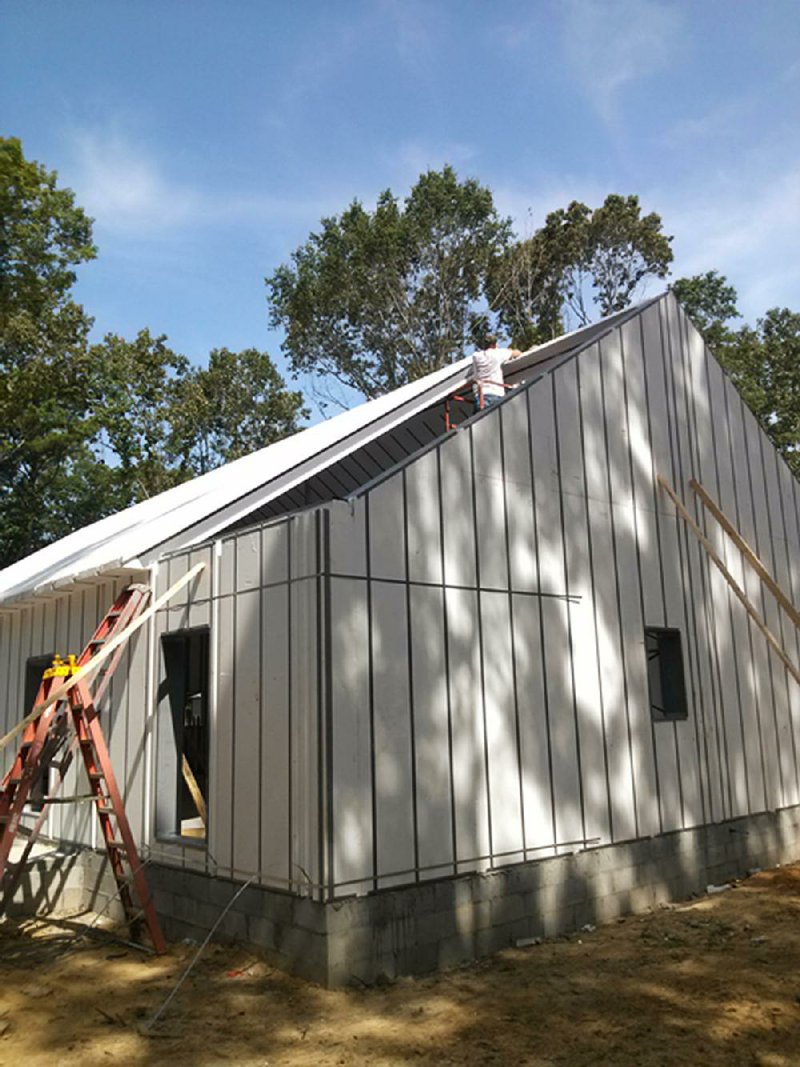Although foam is most frequently associated with disposable coffee cups and packing peanuts, Monticello entrepreneur Zach McClendon hopes to make the material synonymous with construction.
"The way we build houses hasn't changed in 160 years," McClendon said. "These contractors have been doing the same thing all their life."
McClendon is chief executive officer of CFS Green Homes, a company that sells houses made with steel frames and foam panels. The foam provides an envelope of insulation, and the steel frames and metal strapping give the homes strong ratings against tornado-force winds.
McClendon said he has been in talks to rebuild homes and community buildings in the Vilonia area since it was hit in April by an EF4 tornado. He said the notion of a foam house can be a tough sell to some contractors and customers, but he thinks the product will take off as the sustainable-living movement, which focuses on reducing use of the Earth's natural resources, grows.
"People are looking to cut their energy costs," McClendon said. "If you're going to live [in a green home] for 20 years, you've really saved a lot of money."
According to the U.S. Energy Information Adminstration, residential energy consumption in Arkansas fell between 2010 and 2012, the most recent year in which data are available. Nationwide, electricity use per household is expected to fall through 2040.
McClendon's company, which is about 5 years old and has been actively marketing its product for 18 months, touts energy savings of 60 percent compared with wood-frame houses. The steel and foam system costs about 5 percent more upfront.
McClendon once owned Drew Foam Companies, a major supplier of expanded polystyrene foam in the South. He sold the company, but retained rights to the foam house concept developed by engineer John Bargh, who serves as CFS Green Homes' president.
Bargh developed the home concept nine years ago and teamed up with McClendon when he still owned his foam business. The construction materials had to go through a battery of safety standards tests and green energy certifications before the company could begin marketing them.
"We went through so many phases of [testing]," Bargh said. "It's been a lot of hard work, sweat and head-scratching, but we got to where we are now."
McClendon compares the home insulation capabilities of the foam to that of foam coffee cups or ice chests, which trap heat or cold but have comfortable exteriors. It takes 10-inch-thick foam panels to insulate a house. The prefabricated panels arrive at the construction site, and contractors have been averaging about three days to finish a shell of a 1,500- to 2,000-square foot house. The company has mostly worked on smaller houses, but it recently built a 4,000-square-foot house in Little Rock's Heights neighborhood.
David Bean, who runs a geothermal heating company in Cabot, commissioned CFS Green Homes to build two houses on his family's hunting property in Morrilton. Bean uses geothermal heat at his home in Maumelle and said the foam insulation was the best product he could find on the market, though he was also attracted to the homes' strong ratings against tornado-strength winds.
After the first day of construction, severe storms sent strong winds ripping through Morrilton. Several large trees on Bean's property came down, but the house's unsecured frame was undamaged. Contractors picked up where they left off the next day, finishing wall installation and adding the steel strapping system for extra support against high winds.
Bean said he wanted to be sure the houses he built would stand for his children and grandchildren to use in the years to come.
"There are a lot of storms that come through here," Bean said. "I think this is a house that will be here for another 50 years."
Bargh said he expects the company will eventually build houses at a rate of 20 to 30 per month. In addition to houses, the company is also working on projects for the government and is exploring ways to work on housing on American Indian reservations and at military barracks. He said the company is focusing on perfecting its product and establishing itself in the Arkansas market, but hopes the construction will eventually be used in other parts of the country and abroad.
"Every time we build one, we refine it a little more," Bargh said. "I think it should replace the way building is done today," he said. "They're not growing more forests."
SundayMonday Business on 07/13/2014
